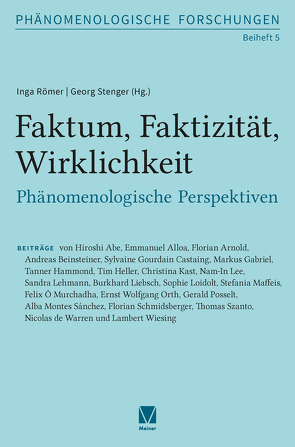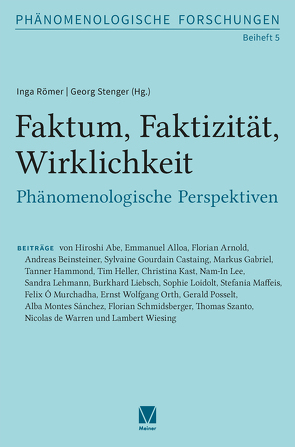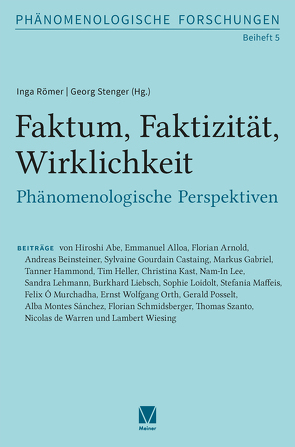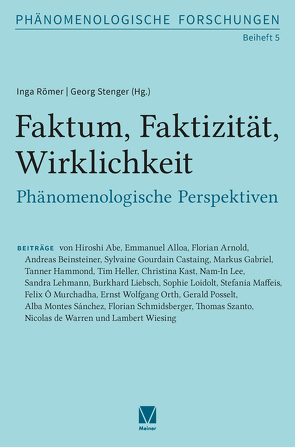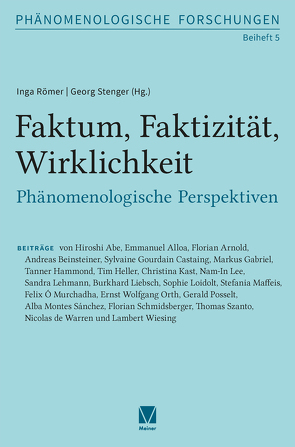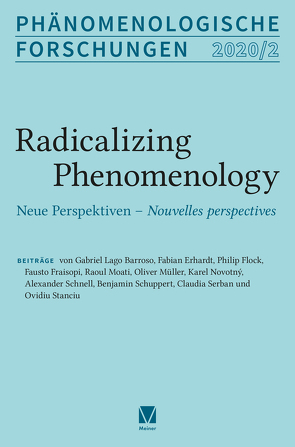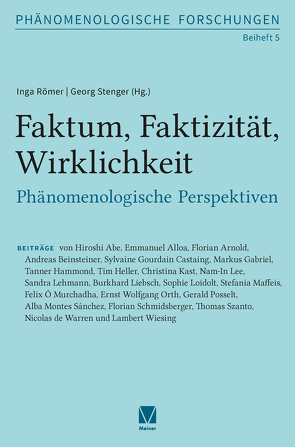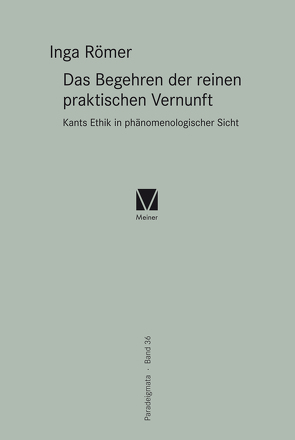
Stehen sich Kants Ethik und die mit Edmund Husserl beginnende phänomenologische Bewegung tatsächlich in Form eines Antagonismus gegenüber? Noch immer wird diese Frage nicht selten bejaht.
Die Hypothese der vorliegenden Studie ist jedoch, dass die Behauptung eines solchen Antagonismus letztlich weder aus der Perspektive der kantischen Schriften noch aus der Entwicklungsgeschichte der Phänomenologie
heraus aufrecht erhalten werden kann. Denn gibt es nicht in Kants Ethik und ihrer Grundlegung Perspektiven, die den Vorwurf des abstrakten, lebensfernen Formalismus bereits entkräften? Und findet
sich im Nachgang zu den materialen Wertethikern nicht innerhalb der phänomenologischen Bewegung der Versuch einer Erneuerung gerade der formalistischen Tendenz der kantischen Ethik?
Die systematische Perspektive, die aus dieser Untersuchung hervorgeht, ist eine Ethik des Begehrens der reinen praktischen Vernunft, in der sich das individuelle Begehren angesichts einer gebietenden Vernunft
auf je eigenem Wege konkretisiert, einer reinen praktischen Vernunft, deren Aufkommen allerdings mit Levinas als genuin intersubjektiv verstanden wird.
Aktualisiert: 2023-06-16
> findR *
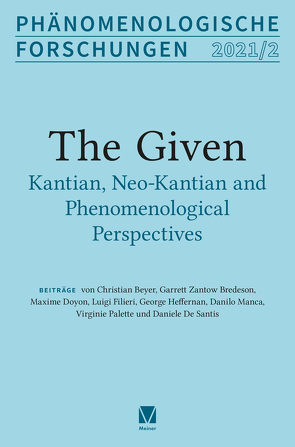
Abstracts
De Santis, Daniele, Manca, Danilo: Introduction. The Given: Historical and Hermeneutical Category or Laziness and Perversion of Reason?
Filieri, Luigi: Sellars and Kant on Givenness and Intuition.
In this paper, I argue that Sellars’s conceptualist reading of Kant, though less radical than more contemporary approaches (e. g., Brandom, McDowell), relies on a controversial account of the relations between the givenness of intuitions, the productive imagination and the power of judgment. I will discuss: 1) how Sellars reconsidered Kant’s account of intuition; and 2) the kind of conceptualism he argues for. I will raise two main claims. First, Sellars’s conceptualist reading of intuition overlooks the role of space and time as givenness conditions. Second, Sellars’s account of the productive imagination disregards the complementary significance of the power of judgment in a priori synthesis, the role of which is to grant synthetic unity. My aim is to reconstruct a consistent dialogue between Sellars and Kant by discussing Sellars’s reading of a priori synthesis and comparing his views to Kant’s original aims.
Bredeson, Garrett Zantow: Natorp’s Critique of Appeals to Givenness in Light of the Marburg Renewal of Idealism.
For Natorp, the most urgent task for turn-of-the-century philosophy consisted in recovering the meaning of idealism. Instead of simply appealing to given facts, idealists transform givennesses of all sorts into tasks for thinking under the guidance of laws which we ourselves have laid down and for which we ourselves are responsible. In this paper I will try to connect the dots between (a) the broader Marburg project of tethering philosophy to the achievements of modern science and (b) Natorp’s critique of his contemporaries’ appeals to givenness. Understanding this connection is, in my view, crucial for appreciating the sense and grounding of Natorp’s idealism.
Palette, Virginie: The Resistance of the Given and its Demythologization in Husserl’s Phenomenology.
The objective of this paper is to reconstruct Husserl’s two-pronged approach of sensory givenness. On the one hand, the phenomenological focus on intentional consciousness implies a virulent criticismof the positivistic myth of the sensory given. On the other hand, there is also a positive appeal to sensory givenness in phenomenology, without which phenomenology would not be worthy of its name and would, ultimately, be nothing other than a form of neo-Kantianism. In the context of transcendental genetic phenomenology, Husserl manages to rehabilitate sensory givenness in a reduced, viz. demythologized form. This reconstruction of Husserl’s ambivalent reference to the given can help phenomenology defend itself against some actual trends, which tend to reduce it to phenomenalismor to conceptualism.
Manca, Danilo: Spontaneity and Givenness. Natorp, Husserl, and Sellars’s Neo-Kantianism.
In this article, I propose a comparison between Natorp, Husserl, and Sellars that has a twofold aim. First, I ask to what extent Sellars’s perspective can be considered to be Neo-Kantian. Second, I demonstrate that the point of divergence among these three thinkers does not have to do with the role they ascribe to givenness in knowledge, but with the way they conceive the activity of thinking. Focusing on Husserl’s reading of Natorp’s theses concerning the subjective and objective ground of knowledge, I show that both Natorp and Husserl agree with Sellars on the limits of a positivistic and empiricist perspective that relies on what is given in perception for the justification of one’s epistemic beliefs. On the other hand, the differences between the three thinkers emerge as soon as we consider how they attempt to integrate the spontaneity of thinking into the sphere of intuition from a renewed Kantian perspective.
De Santis, Daniele: Thought, Being, and the Given in Hans Vaihinger’s Die Philosophie des Als Ob.
The goal of the present paper is to assess Hans Vaihinger’s understanding of the notion of the given in Die Philosophie des Als Ob. The claim will be advanced that the overall framework of Vaihinger’s theory of knowledge and, more specifically, his understanding of both the given and fictions should be sought for in the manner in which R. Hermann Lotze assesses the problem of knowledge, namely, the relation between thought and being in both his early and late Logik. As we will argue, the way in which Vaihinger recasts the opposition between what is given objectively (data of sensations) and what is added subjectively is to be deemed a direct radicalization of Lotze’s own stance. As the conclusion will further add, what is at stake in Vaihinger’s fictionalism is a quite specific understanding of the ideas of reason and transcendental philosophy.
Beyer, Christian: Husserls Verhältnis zu Lotze im Lichte seines Göttinger Seminars über „Lotzes Erkenntnistheorie“.
The present contribution elucidates Husserl’s relationship to Lotze in the light of Winthrop Bell’s notes on Husserl’s 1912 seminar on Lotze’s theory of knowledge. Once again, these notes make it clear that Husserl highly appreciated the chapter on Plato’s theory of ideas from Lotze’s 1874 Logic and his anti-psychologistic view of logic, as far as it goes. However, it also becomes clear that Husserl rejected both Lotze’s account of the origins of objectivity in terms of the doctrine of “achievements of thinking (Denkleistungen)” and the discussion of skepticism in the 1874 Logic against the background of his own (Bolzano-inspired) conception of intentionality and his treatment of the epistemological “problem of transcendence” in the framework of the “phenomenological reduction”.
Hefferman, George: Existential Evidence. The Role of Self-Giving in Husserl’s Phenomenology of Existence.
In this paper, I examine, in five parts, the nature and function of evidence in Husserl’s phenomenology of existence. By “evidence” I understand the intentional achievement of self-giving in Husserl’s sense, and by “phenomenology of existence” I understand the branch of his philosophy that addresses the question concerning a meaningful life. In Part One, I propose that Husserl’s philosophy includes a phenomenology of existence. In Part Two, I employ a selection of texts from Grenzprobleme der Phänomenologie to sketch the basic outlines of his phenomenology of existence. In Part Three, I demonstrate that Husserl develops a concept of evidence rich enough to encompass the evidence appropriate to his phenomenology of existence. In Part Four, I investigate the way in which Husserl appeals to what one may describe as “existential evidence” to ground his manner of apprehending the world as he sees it. In Part Five, I expand the horizon of the investigation by situating “existential evidence” – the “given” that keeps on giving – in the context of other kinds of evidence more familiar to scholars and students of Husserl’s phenomenology.
Doyon, Maxime: La Gestalt d’autrui. Note sur l’étendue de l’influence de la Gestaltpsychologie chez Merleau-Ponty.
The recognition of a meaningful sensory foundation of perception is central to Maurice Merleau-Ponty’s philosophy. If some commentators do not hesitate to see in the notion of perceptual Gestalt a notion applicable to all domains of being, it is not a priori easy to see how it must be conceived in the more specific context of the perception of others (autrui). However, Merleau-Ponty is very clear on this point: all perception manifests itself in the form of a Gestalt, including the perception of other people. The ambition of this short study is to spell out in rough strokes how this injunction should be heard and thus to explain how others manifest themselves as Gestalts to perceptual consciousness.
Aktualisiert: 2023-06-16
> findR *
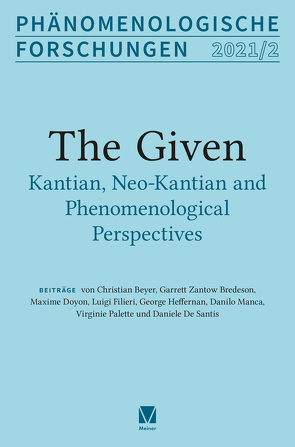
Abstracts
De Santis, Daniele, Manca, Danilo: Introduction. The Given: Historical and Hermeneutical Category or Laziness and Perversion of Reason?
Filieri, Luigi: Sellars and Kant on Givenness and Intuition.
In this paper, I argue that Sellars’s conceptualist reading of Kant, though less radical than more contemporary approaches (e. g., Brandom, McDowell), relies on a controversial account of the relations between the givenness of intuitions, the productive imagination and the power of judgment. I will discuss: 1) how Sellars reconsidered Kant’s account of intuition; and 2) the kind of conceptualism he argues for. I will raise two main claims. First, Sellars’s conceptualist reading of intuition overlooks the role of space and time as givenness conditions. Second, Sellars’s account of the productive imagination disregards the complementary significance of the power of judgment in a priori synthesis, the role of which is to grant synthetic unity. My aim is to reconstruct a consistent dialogue between Sellars and Kant by discussing Sellars’s reading of a priori synthesis and comparing his views to Kant’s original aims.
Bredeson, Garrett Zantow: Natorp’s Critique of Appeals to Givenness in Light of the Marburg Renewal of Idealism.
For Natorp, the most urgent task for turn-of-the-century philosophy consisted in recovering the meaning of idealism. Instead of simply appealing to given facts, idealists transform givennesses of all sorts into tasks for thinking under the guidance of laws which we ourselves have laid down and for which we ourselves are responsible. In this paper I will try to connect the dots between (a) the broader Marburg project of tethering philosophy to the achievements of modern science and (b) Natorp’s critique of his contemporaries’ appeals to givenness. Understanding this connection is, in my view, crucial for appreciating the sense and grounding of Natorp’s idealism.
Palette, Virginie: The Resistance of the Given and its Demythologization in Husserl’s Phenomenology.
The objective of this paper is to reconstruct Husserl’s two-pronged approach of sensory givenness. On the one hand, the phenomenological focus on intentional consciousness implies a virulent criticismof the positivistic myth of the sensory given. On the other hand, there is also a positive appeal to sensory givenness in phenomenology, without which phenomenology would not be worthy of its name and would, ultimately, be nothing other than a form of neo-Kantianism. In the context of transcendental genetic phenomenology, Husserl manages to rehabilitate sensory givenness in a reduced, viz. demythologized form. This reconstruction of Husserl’s ambivalent reference to the given can help phenomenology defend itself against some actual trends, which tend to reduce it to phenomenalismor to conceptualism.
Manca, Danilo: Spontaneity and Givenness. Natorp, Husserl, and Sellars’s Neo-Kantianism.
In this article, I propose a comparison between Natorp, Husserl, and Sellars that has a twofold aim. First, I ask to what extent Sellars’s perspective can be considered to be Neo-Kantian. Second, I demonstrate that the point of divergence among these three thinkers does not have to do with the role they ascribe to givenness in knowledge, but with the way they conceive the activity of thinking. Focusing on Husserl’s reading of Natorp’s theses concerning the subjective and objective ground of knowledge, I show that both Natorp and Husserl agree with Sellars on the limits of a positivistic and empiricist perspective that relies on what is given in perception for the justification of one’s epistemic beliefs. On the other hand, the differences between the three thinkers emerge as soon as we consider how they attempt to integrate the spontaneity of thinking into the sphere of intuition from a renewed Kantian perspective.
De Santis, Daniele: Thought, Being, and the Given in Hans Vaihinger’s Die Philosophie des Als Ob.
The goal of the present paper is to assess Hans Vaihinger’s understanding of the notion of the given in Die Philosophie des Als Ob. The claim will be advanced that the overall framework of Vaihinger’s theory of knowledge and, more specifically, his understanding of both the given and fictions should be sought for in the manner in which R. Hermann Lotze assesses the problem of knowledge, namely, the relation between thought and being in both his early and late Logik. As we will argue, the way in which Vaihinger recasts the opposition between what is given objectively (data of sensations) and what is added subjectively is to be deemed a direct radicalization of Lotze’s own stance. As the conclusion will further add, what is at stake in Vaihinger’s fictionalism is a quite specific understanding of the ideas of reason and transcendental philosophy.
Beyer, Christian: Husserls Verhältnis zu Lotze im Lichte seines Göttinger Seminars über „Lotzes Erkenntnistheorie“.
The present contribution elucidates Husserl’s relationship to Lotze in the light of Winthrop Bell’s notes on Husserl’s 1912 seminar on Lotze’s theory of knowledge. Once again, these notes make it clear that Husserl highly appreciated the chapter on Plato’s theory of ideas from Lotze’s 1874 Logic and his anti-psychologistic view of logic, as far as it goes. However, it also becomes clear that Husserl rejected both Lotze’s account of the origins of objectivity in terms of the doctrine of “achievements of thinking (Denkleistungen)” and the discussion of skepticism in the 1874 Logic against the background of his own (Bolzano-inspired) conception of intentionality and his treatment of the epistemological “problem of transcendence” in the framework of the “phenomenological reduction”.
Hefferman, George: Existential Evidence. The Role of Self-Giving in Husserl’s Phenomenology of Existence.
In this paper, I examine, in five parts, the nature and function of evidence in Husserl’s phenomenology of existence. By “evidence” I understand the intentional achievement of self-giving in Husserl’s sense, and by “phenomenology of existence” I understand the branch of his philosophy that addresses the question concerning a meaningful life. In Part One, I propose that Husserl’s philosophy includes a phenomenology of existence. In Part Two, I employ a selection of texts from Grenzprobleme der Phänomenologie to sketch the basic outlines of his phenomenology of existence. In Part Three, I demonstrate that Husserl develops a concept of evidence rich enough to encompass the evidence appropriate to his phenomenology of existence. In Part Four, I investigate the way in which Husserl appeals to what one may describe as “existential evidence” to ground his manner of apprehending the world as he sees it. In Part Five, I expand the horizon of the investigation by situating “existential evidence” – the “given” that keeps on giving – in the context of other kinds of evidence more familiar to scholars and students of Husserl’s phenomenology.
Doyon, Maxime: La Gestalt d’autrui. Note sur l’étendue de l’influence de la Gestaltpsychologie chez Merleau-Ponty.
The recognition of a meaningful sensory foundation of perception is central to Maurice Merleau-Ponty’s philosophy. If some commentators do not hesitate to see in the notion of perceptual Gestalt a notion applicable to all domains of being, it is not a priori easy to see how it must be conceived in the more specific context of the perception of others (autrui). However, Merleau-Ponty is very clear on this point: all perception manifests itself in the form of a Gestalt, including the perception of other people. The ambition of this short study is to spell out in rough strokes how this injunction should be heard and thus to explain how others manifest themselves as Gestalts to perceptual consciousness.
Aktualisiert: 2023-06-16
> findR *
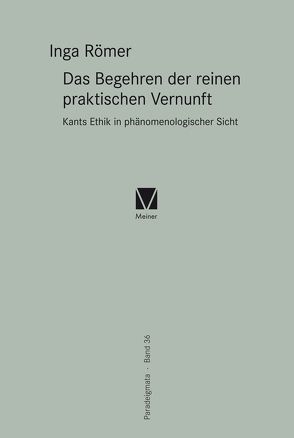
Stehen sich Kants Ethik und die mit Edmund Husserl beginnende phänomenologische Bewegung tatsächlich in Form eines Antagonismus gegenüber? Noch immer wird diese Frage nicht selten bejaht. Die Hypothese der vorliegenden Studie ist jedoch, dass die Behauptung eines solchen Antagonismus letztlich weder aus der Perspektive der kantischen Schriften noch aus der Entwicklungsgeschichte der Phänomenologie heraus aufrecht erhalten werden kann. Denn gibt es nicht in Kants Ethik und ihrer Grundlegung Perspektiven, die den Vorwurf des abstrakten, lebensfernen Formalismus bereits entkräften? Und findet sich im Nachgang zu den materialen Wertethikern nicht innerhalb der phänomenologischen Bewegung der Versuch einer Erneuerung gerade der formalistischen Tendenz der kantischen Ethik? Die systematische Perspektive, die aus dieser Untersuchung hervorgeht, ist eine Ethik des Begehrens der reinen praktischen Vernunft, in der sich das individuelle Begehren angesichts einer gebietenden Vernunft auf je eigenem Wege konkretisiert, einer reinen praktischen Vernunft, deren Aufkommen allerdings mit Levinas als genuin intersubjektiv verstanden wird.
Aktualisiert: 2023-06-14
> findR *
Was ist ein Faktum? Was ist Faktizität? Was ist Wirklichkeit? Diese Fragen behandelt der Band in einer phänomenologischen Perspektive. Es geht einerseits darum, zu erörtern, ob und wie die Phänomenologie zur Kritik, die ihr in jüngerer Zeit von Seiten des „neuen Realismus” entgegengebracht wurde, Stellung zu nehmen vermag. Andererseits suchen die Beiträge, phänomenologische Begriffe des Realen oder der Realität zu präzisieren. Sechs Themenfelder stehen dabei im Vordergrund: 1. Phänomenologie und Realismus, 2. Wirklichkeit – Sozialität – Politik, 3. Faktizität der Lebenswelt, 4. Realität und Alterität, 5. Fakten und Emotionen, 6. Technische Transformationen des Weltbezugs.
Aktualisiert: 2023-06-14
> findR *
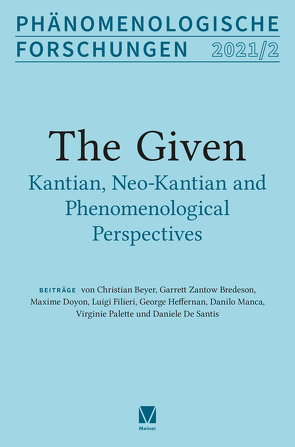
Abstracts
De Santis, Daniele, Manca, Danilo: Introduction. The Given: Historical and Hermeneutical Category or Laziness and Perversion of Reason?
Filieri, Luigi: Sellars and Kant on Givenness and Intuition.
In this paper, I argue that Sellars’s conceptualist reading of Kant, though less radical than more contemporary approaches (e. g., Brandom, McDowell), relies on a controversial account of the relations between the givenness of intuitions, the productive imagination and the power of judgment. I will discuss: 1) how Sellars reconsidered Kant’s account of intuition; and 2) the kind of conceptualism he argues for. I will raise two main claims. First, Sellars’s conceptualist reading of intuition overlooks the role of space and time as givenness conditions. Second, Sellars’s account of the productive imagination disregards the complementary significance of the power of judgment in a priori synthesis, the role of which is to grant synthetic unity. My aim is to reconstruct a consistent dialogue between Sellars and Kant by discussing Sellars’s reading of a priori synthesis and comparing his views to Kant’s original aims.
Bredeson, Garrett Zantow: Natorp’s Critique of Appeals to Givenness in Light of the Marburg Renewal of Idealism.
For Natorp, the most urgent task for turn-of-the-century philosophy consisted in recovering the meaning of idealism. Instead of simply appealing to given facts, idealists transform givennesses of all sorts into tasks for thinking under the guidance of laws which we ourselves have laid down and for which we ourselves are responsible. In this paper I will try to connect the dots between (a) the broader Marburg project of tethering philosophy to the achievements of modern science and (b) Natorp’s critique of his contemporaries’ appeals to givenness. Understanding this connection is, in my view, crucial for appreciating the sense and grounding of Natorp’s idealism.
Palette, Virginie: The Resistance of the Given and its Demythologization in Husserl’s Phenomenology.
The objective of this paper is to reconstruct Husserl’s two-pronged approach of sensory givenness. On the one hand, the phenomenological focus on intentional consciousness implies a virulent criticismof the positivistic myth of the sensory given. On the other hand, there is also a positive appeal to sensory givenness in phenomenology, without which phenomenology would not be worthy of its name and would, ultimately, be nothing other than a form of neo-Kantianism. In the context of transcendental genetic phenomenology, Husserl manages to rehabilitate sensory givenness in a reduced, viz. demythologized form. This reconstruction of Husserl’s ambivalent reference to the given can help phenomenology defend itself against some actual trends, which tend to reduce it to phenomenalismor to conceptualism.
Manca, Danilo: Spontaneity and Givenness. Natorp, Husserl, and Sellars’s Neo-Kantianism.
In this article, I propose a comparison between Natorp, Husserl, and Sellars that has a twofold aim. First, I ask to what extent Sellars’s perspective can be considered to be Neo-Kantian. Second, I demonstrate that the point of divergence among these three thinkers does not have to do with the role they ascribe to givenness in knowledge, but with the way they conceive the activity of thinking. Focusing on Husserl’s reading of Natorp’s theses concerning the subjective and objective ground of knowledge, I show that both Natorp and Husserl agree with Sellars on the limits of a positivistic and empiricist perspective that relies on what is given in perception for the justification of one’s epistemic beliefs. On the other hand, the differences between the three thinkers emerge as soon as we consider how they attempt to integrate the spontaneity of thinking into the sphere of intuition from a renewed Kantian perspective.
De Santis, Daniele: Thought, Being, and the Given in Hans Vaihinger’s Die Philosophie des Als Ob.
The goal of the present paper is to assess Hans Vaihinger’s understanding of the notion of the given in Die Philosophie des Als Ob. The claim will be advanced that the overall framework of Vaihinger’s theory of knowledge and, more specifically, his understanding of both the given and fictions should be sought for in the manner in which R. Hermann Lotze assesses the problem of knowledge, namely, the relation between thought and being in both his early and late Logik. As we will argue, the way in which Vaihinger recasts the opposition between what is given objectively (data of sensations) and what is added subjectively is to be deemed a direct radicalization of Lotze’s own stance. As the conclusion will further add, what is at stake in Vaihinger’s fictionalism is a quite specific understanding of the ideas of reason and transcendental philosophy.
Beyer, Christian: Husserls Verhältnis zu Lotze im Lichte seines Göttinger Seminars über „Lotzes Erkenntnistheorie“.
The present contribution elucidates Husserl’s relationship to Lotze in the light of Winthrop Bell’s notes on Husserl’s 1912 seminar on Lotze’s theory of knowledge. Once again, these notes make it clear that Husserl highly appreciated the chapter on Plato’s theory of ideas from Lotze’s 1874 Logic and his anti-psychologistic view of logic, as far as it goes. However, it also becomes clear that Husserl rejected both Lotze’s account of the origins of objectivity in terms of the doctrine of “achievements of thinking (Denkleistungen)” and the discussion of skepticism in the 1874 Logic against the background of his own (Bolzano-inspired) conception of intentionality and his treatment of the epistemological “problem of transcendence” in the framework of the “phenomenological reduction”.
Hefferman, George: Existential Evidence. The Role of Self-Giving in Husserl’s Phenomenology of Existence.
In this paper, I examine, in five parts, the nature and function of evidence in Husserl’s phenomenology of existence. By “evidence” I understand the intentional achievement of self-giving in Husserl’s sense, and by “phenomenology of existence” I understand the branch of his philosophy that addresses the question concerning a meaningful life. In Part One, I propose that Husserl’s philosophy includes a phenomenology of existence. In Part Two, I employ a selection of texts from Grenzprobleme der Phänomenologie to sketch the basic outlines of his phenomenology of existence. In Part Three, I demonstrate that Husserl develops a concept of evidence rich enough to encompass the evidence appropriate to his phenomenology of existence. In Part Four, I investigate the way in which Husserl appeals to what one may describe as “existential evidence” to ground his manner of apprehending the world as he sees it. In Part Five, I expand the horizon of the investigation by situating “existential evidence” – the “given” that keeps on giving – in the context of other kinds of evidence more familiar to scholars and students of Husserl’s phenomenology.
Doyon, Maxime: La Gestalt d’autrui. Note sur l’étendue de l’influence de la Gestaltpsychologie chez Merleau-Ponty.
The recognition of a meaningful sensory foundation of perception is central to Maurice Merleau-Ponty’s philosophy. If some commentators do not hesitate to see in the notion of perceptual Gestalt a notion applicable to all domains of being, it is not a priori easy to see how it must be conceived in the more specific context of the perception of others (autrui). However, Merleau-Ponty is very clear on this point: all perception manifests itself in the form of a Gestalt, including the perception of other people. The ambition of this short study is to spell out in rough strokes how this injunction should be heard and thus to explain how others manifest themselves as Gestalts to perceptual consciousness.
Aktualisiert: 2023-06-14
> findR *

Abstracts
De Santis, Daniele, Manca, Danilo: Introduction. The Given: Historical and Hermeneutical Category or Laziness and Perversion of Reason?
Filieri, Luigi: Sellars and Kant on Givenness and Intuition.
In this paper, I argue that Sellars’s conceptualist reading of Kant, though less radical than more contemporary approaches (e. g., Brandom, McDowell), relies on a controversial account of the relations between the givenness of intuitions, the productive imagination and the power of judgment. I will discuss: 1) how Sellars reconsidered Kant’s account of intuition; and 2) the kind of conceptualism he argues for. I will raise two main claims. First, Sellars’s conceptualist reading of intuition overlooks the role of space and time as givenness conditions. Second, Sellars’s account of the productive imagination disregards the complementary significance of the power of judgment in a priori synthesis, the role of which is to grant synthetic unity. My aim is to reconstruct a consistent dialogue between Sellars and Kant by discussing Sellars’s reading of a priori synthesis and comparing his views to Kant’s original aims.
Bredeson, Garrett Zantow: Natorp’s Critique of Appeals to Givenness in Light of the Marburg Renewal of Idealism.
For Natorp, the most urgent task for turn-of-the-century philosophy consisted in recovering the meaning of idealism. Instead of simply appealing to given facts, idealists transform givennesses of all sorts into tasks for thinking under the guidance of laws which we ourselves have laid down and for which we ourselves are responsible. In this paper I will try to connect the dots between (a) the broader Marburg project of tethering philosophy to the achievements of modern science and (b) Natorp’s critique of his contemporaries’ appeals to givenness. Understanding this connection is, in my view, crucial for appreciating the sense and grounding of Natorp’s idealism.
Palette, Virginie: The Resistance of the Given and its Demythologization in Husserl’s Phenomenology.
The objective of this paper is to reconstruct Husserl’s two-pronged approach of sensory givenness. On the one hand, the phenomenological focus on intentional consciousness implies a virulent criticismof the positivistic myth of the sensory given. On the other hand, there is also a positive appeal to sensory givenness in phenomenology, without which phenomenology would not be worthy of its name and would, ultimately, be nothing other than a form of neo-Kantianism. In the context of transcendental genetic phenomenology, Husserl manages to rehabilitate sensory givenness in a reduced, viz. demythologized form. This reconstruction of Husserl’s ambivalent reference to the given can help phenomenology defend itself against some actual trends, which tend to reduce it to phenomenalismor to conceptualism.
Manca, Danilo: Spontaneity and Givenness. Natorp, Husserl, and Sellars’s Neo-Kantianism.
In this article, I propose a comparison between Natorp, Husserl, and Sellars that has a twofold aim. First, I ask to what extent Sellars’s perspective can be considered to be Neo-Kantian. Second, I demonstrate that the point of divergence among these three thinkers does not have to do with the role they ascribe to givenness in knowledge, but with the way they conceive the activity of thinking. Focusing on Husserl’s reading of Natorp’s theses concerning the subjective and objective ground of knowledge, I show that both Natorp and Husserl agree with Sellars on the limits of a positivistic and empiricist perspective that relies on what is given in perception for the justification of one’s epistemic beliefs. On the other hand, the differences between the three thinkers emerge as soon as we consider how they attempt to integrate the spontaneity of thinking into the sphere of intuition from a renewed Kantian perspective.
De Santis, Daniele: Thought, Being, and the Given in Hans Vaihinger’s Die Philosophie des Als Ob.
The goal of the present paper is to assess Hans Vaihinger’s understanding of the notion of the given in Die Philosophie des Als Ob. The claim will be advanced that the overall framework of Vaihinger’s theory of knowledge and, more specifically, his understanding of both the given and fictions should be sought for in the manner in which R. Hermann Lotze assesses the problem of knowledge, namely, the relation between thought and being in both his early and late Logik. As we will argue, the way in which Vaihinger recasts the opposition between what is given objectively (data of sensations) and what is added subjectively is to be deemed a direct radicalization of Lotze’s own stance. As the conclusion will further add, what is at stake in Vaihinger’s fictionalism is a quite specific understanding of the ideas of reason and transcendental philosophy.
Beyer, Christian: Husserls Verhältnis zu Lotze im Lichte seines Göttinger Seminars über „Lotzes Erkenntnistheorie“.
The present contribution elucidates Husserl’s relationship to Lotze in the light of Winthrop Bell’s notes on Husserl’s 1912 seminar on Lotze’s theory of knowledge. Once again, these notes make it clear that Husserl highly appreciated the chapter on Plato’s theory of ideas from Lotze’s 1874 Logic and his anti-psychologistic view of logic, as far as it goes. However, it also becomes clear that Husserl rejected both Lotze’s account of the origins of objectivity in terms of the doctrine of “achievements of thinking (Denkleistungen)” and the discussion of skepticism in the 1874 Logic against the background of his own (Bolzano-inspired) conception of intentionality and his treatment of the epistemological “problem of transcendence” in the framework of the “phenomenological reduction”.
Hefferman, George: Existential Evidence. The Role of Self-Giving in Husserl’s Phenomenology of Existence.
In this paper, I examine, in five parts, the nature and function of evidence in Husserl’s phenomenology of existence. By “evidence” I understand the intentional achievement of self-giving in Husserl’s sense, and by “phenomenology of existence” I understand the branch of his philosophy that addresses the question concerning a meaningful life. In Part One, I propose that Husserl’s philosophy includes a phenomenology of existence. In Part Two, I employ a selection of texts from Grenzprobleme der Phänomenologie to sketch the basic outlines of his phenomenology of existence. In Part Three, I demonstrate that Husserl develops a concept of evidence rich enough to encompass the evidence appropriate to his phenomenology of existence. In Part Four, I investigate the way in which Husserl appeals to what one may describe as “existential evidence” to ground his manner of apprehending the world as he sees it. In Part Five, I expand the horizon of the investigation by situating “existential evidence” – the “given” that keeps on giving – in the context of other kinds of evidence more familiar to scholars and students of Husserl’s phenomenology.
Doyon, Maxime: La Gestalt d’autrui. Note sur l’étendue de l’influence de la Gestaltpsychologie chez Merleau-Ponty.
The recognition of a meaningful sensory foundation of perception is central to Maurice Merleau-Ponty’s philosophy. If some commentators do not hesitate to see in the notion of perceptual Gestalt a notion applicable to all domains of being, it is not a priori easy to see how it must be conceived in the more specific context of the perception of others (autrui). However, Merleau-Ponty is very clear on this point: all perception manifests itself in the form of a Gestalt, including the perception of other people. The ambition of this short study is to spell out in rough strokes how this injunction should be heard and thus to explain how others manifest themselves as Gestalts to perceptual consciousness.
Aktualisiert: 2023-06-14
> findR *
Was ist ein Faktum? Was ist Faktizität? Was ist Wirklichkeit? Diese Fragen behandelt der Band in einer phänomenologischen Perspektive. Es geht einerseits darum, zu erörtern, ob und wie die Phänomenologie zur Kritik, die ihr in jüngerer Zeit von Seiten des „neuen Realismus” entgegengebracht wurde, Stellung zu nehmen vermag. Andererseits suchen die Beiträge, phänomenologische Begriffe des Realen oder der Realität zu präzisieren. Sechs Themenfelder stehen dabei im Vordergrund: 1. Phänomenologie und Realismus, 2. Wirklichkeit – Sozialität – Politik, 3. Faktizität der Lebenswelt, 4. Realität und Alterität, 5. Fakten und Emotionen, 6. Technische Transformationen des Weltbezugs.
Aktualisiert: 2023-06-03
> findR *
Was ist ein Faktum? Was ist Faktizität? Was ist Wirklichkeit? Diese Fragen behandelt der Band in einer phänomenologischen Perspektive. Es geht einerseits darum, zu erörtern, ob und wie die Phänomenologie zur Kritik, die ihr in jüngerer Zeit von Seiten des „neuen Realismus” entgegengebracht wurde, Stellung zu nehmen vermag. Andererseits suchen die Beiträge, phänomenologische Begriffe des Realen oder der Realität zu präzisieren. Sechs Themenfelder stehen dabei im Vordergrund: 1. Phänomenologie und Realismus, 2. Wirklichkeit – Sozialität – Politik, 3. Faktizität der Lebenswelt, 4. Realität und Alterität, 5. Fakten und Emotionen, 6. Technische Transformationen des Weltbezugs.
Aktualisiert: 2023-06-02
> findR *
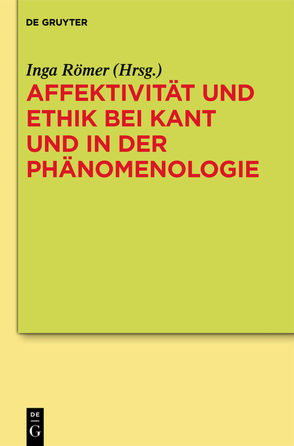
Die Aufsatzsammlung geht der Frage nach der Bedeutung der Affektivität für die Ethik nach, indem sie zwei Traditionen füreinander fruchtbar macht, die sich bisher gegeneinander abgegrenzt, ja nahezu ignoriert haben: die Kant-Forschung und die Tradition der Phänomenologie. Aus zwei Gründen ist es an der Zeit, diese verfestigte Frontstellung aufzubrechen. Zum einen schenkt die Kant-Forschung im Rahmen eines anwachsenden Interesses an der Tugendlehre dem in phänomenologischen Ansätzen zur Ethik seit jeher zentralen Gefühl immer größere Aufmerksamkeit. Zum anderen beschränkt sich die phänomenologische Ethik längst nicht mehr auf die von Kantianern traditionell kritisch gesehene materiale Wertethik. Der Band möchte mit Blick auf diese aktuelle Forschungslage in den beiden Feldern eine Verständigung der beiden Forschungsbereiche eröffnen und dadurch zugleich die systematische Frage nach der Affektivität in der Ethik voranbringen. Mit Beiträgen von Manfred Baum, Steven Crowell, Andrea Esser, Heiner Klemme, Bernd Ludwig, Dieter Schönecker, Sonja Rinofner-Kreidl, László Tengelyi und anderen.
Aktualisiert: 2023-05-29
> findR *
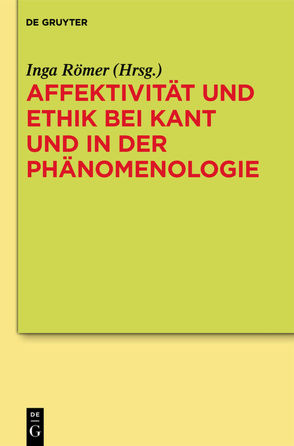
Die Aufsatzsammlung geht der Frage nach der Bedeutung der Affektivität für die Ethik nach, indem sie zwei Traditionen füreinander fruchtbar macht, die sich bisher gegeneinander abgegrenzt, ja nahezu ignoriert haben: die Kant-Forschung und die Tradition der Phänomenologie. Aus zwei Gründen ist es an der Zeit, diese verfestigte Frontstellung aufzubrechen. Zum einen schenkt die Kant-Forschung im Rahmen eines anwachsenden Interesses an der Tugendlehre dem in phänomenologischen Ansätzen zur Ethik seit jeher zentralen Gefühl immer größere Aufmerksamkeit. Zum anderen beschränkt sich die phänomenologische Ethik längst nicht mehr auf die von Kantianern traditionell kritisch gesehene materiale Wertethik. Der Band möchte mit Blick auf diese aktuelle Forschungslage in den beiden Feldern eine Verständigung der beiden Forschungsbereiche eröffnen und dadurch zugleich die systematische Frage nach der Affektivität in der Ethik voranbringen. Mit Beiträgen von Manfred Baum, Steven Crowell, Andrea Esser, Heiner Klemme, Bernd Ludwig, Dieter Schönecker, Sonja Rinofner-Kreidl, László Tengelyi und anderen.
Aktualisiert: 2023-05-29
> findR *
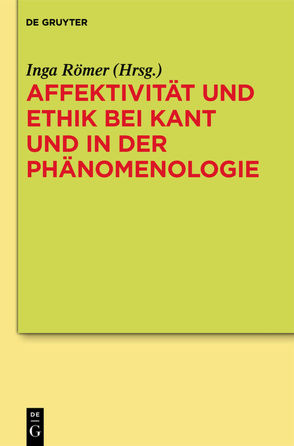
Die Aufsatzsammlung geht der Frage nach der Bedeutung der Affektivität für die Ethik nach, indem sie zwei Traditionen füreinander fruchtbar macht, die sich bisher gegeneinander abgegrenzt, ja nahezu ignoriert haben: die Kant-Forschung und die Tradition der Phänomenologie. Aus zwei Gründen ist es an der Zeit, diese verfestigte Frontstellung aufzubrechen. Zum einen schenkt die Kant-Forschung im Rahmen eines anwachsenden Interesses an der Tugendlehre dem in phänomenologischen Ansätzen zur Ethik seit jeher zentralen Gefühl immer größere Aufmerksamkeit. Zum anderen beschränkt sich die phänomenologische Ethik längst nicht mehr auf die von Kantianern traditionell kritisch gesehene materiale Wertethik. Der Band möchte mit Blick auf diese aktuelle Forschungslage in den beiden Feldern eine Verständigung der beiden Forschungsbereiche eröffnen und dadurch zugleich die systematische Frage nach der Affektivität in der Ethik voranbringen. Mit Beiträgen von Manfred Baum, Steven Crowell, Andrea Esser, Heiner Klemme, Bernd Ludwig, Dieter Schönecker, Sonja Rinofner-Kreidl, László Tengelyi und anderen.
Aktualisiert: 2023-05-29
> findR *
Was ist ein Faktum? Was ist Faktizität? Was ist Wirklichkeit? Diese Fragen behandelt der Band in einer phänomenologischen Perspektive. Es geht einerseits darum, zu erörtern, ob und wie die Phänomenologie zur Kritik, die ihr in jüngerer Zeit von Seiten des „neuen Realismus” entgegengebracht wurde, Stellung zu nehmen vermag. Andererseits suchen die Beiträge, phänomenologische Begriffe des Realen oder der Realität zu präzisieren. Sechs Themenfelder stehen dabei im Vordergrund: 1. Phänomenologie und Realismus, 2. Wirklichkeit – Sozialität – Politik, 3. Faktizität der Lebenswelt, 4. Realität und Alterität, 5. Fakten und Emotionen, 6. Technische Transformationen des Weltbezugs.
Aktualisiert: 2023-05-27
> findR *
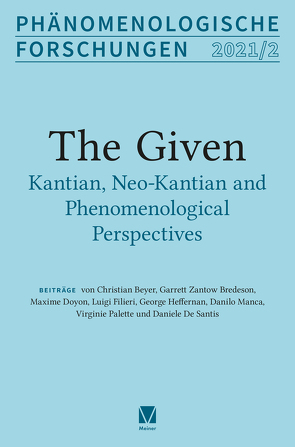
Abstracts
De Santis, Daniele, Manca, Danilo: Introduction. The Given: Historical and Hermeneutical Category or Laziness and Perversion of Reason?
Filieri, Luigi: Sellars and Kant on Givenness and Intuition.
In this paper, I argue that Sellars’s conceptualist reading of Kant, though less radical than more contemporary approaches (e. g., Brandom, McDowell), relies on a controversial account of the relations between the givenness of intuitions, the productive imagination and the power of judgment. I will discuss: 1) how Sellars reconsidered Kant’s account of intuition; and 2) the kind of conceptualism he argues for. I will raise two main claims. First, Sellars’s conceptualist reading of intuition overlooks the role of space and time as givenness conditions. Second, Sellars’s account of the productive imagination disregards the complementary significance of the power of judgment in a priori synthesis, the role of which is to grant synthetic unity. My aim is to reconstruct a consistent dialogue between Sellars and Kant by discussing Sellars’s reading of a priori synthesis and comparing his views to Kant’s original aims.
Bredeson, Garrett Zantow: Natorp’s Critique of Appeals to Givenness in Light of the Marburg Renewal of Idealism.
For Natorp, the most urgent task for turn-of-the-century philosophy consisted in recovering the meaning of idealism. Instead of simply appealing to given facts, idealists transform givennesses of all sorts into tasks for thinking under the guidance of laws which we ourselves have laid down and for which we ourselves are responsible. In this paper I will try to connect the dots between (a) the broader Marburg project of tethering philosophy to the achievements of modern science and (b) Natorp’s critique of his contemporaries’ appeals to givenness. Understanding this connection is, in my view, crucial for appreciating the sense and grounding of Natorp’s idealism.
Palette, Virginie: The Resistance of the Given and its Demythologization in Husserl’s Phenomenology.
The objective of this paper is to reconstruct Husserl’s two-pronged approach of sensory givenness. On the one hand, the phenomenological focus on intentional consciousness implies a virulent criticismof the positivistic myth of the sensory given. On the other hand, there is also a positive appeal to sensory givenness in phenomenology, without which phenomenology would not be worthy of its name and would, ultimately, be nothing other than a form of neo-Kantianism. In the context of transcendental genetic phenomenology, Husserl manages to rehabilitate sensory givenness in a reduced, viz. demythologized form. This reconstruction of Husserl’s ambivalent reference to the given can help phenomenology defend itself against some actual trends, which tend to reduce it to phenomenalismor to conceptualism.
Manca, Danilo: Spontaneity and Givenness. Natorp, Husserl, and Sellars’s Neo-Kantianism.
In this article, I propose a comparison between Natorp, Husserl, and Sellars that has a twofold aim. First, I ask to what extent Sellars’s perspective can be considered to be Neo-Kantian. Second, I demonstrate that the point of divergence among these three thinkers does not have to do with the role they ascribe to givenness in knowledge, but with the way they conceive the activity of thinking. Focusing on Husserl’s reading of Natorp’s theses concerning the subjective and objective ground of knowledge, I show that both Natorp and Husserl agree with Sellars on the limits of a positivistic and empiricist perspective that relies on what is given in perception for the justification of one’s epistemic beliefs. On the other hand, the differences between the three thinkers emerge as soon as we consider how they attempt to integrate the spontaneity of thinking into the sphere of intuition from a renewed Kantian perspective.
De Santis, Daniele: Thought, Being, and the Given in Hans Vaihinger’s Die Philosophie des Als Ob.
The goal of the present paper is to assess Hans Vaihinger’s understanding of the notion of the given in Die Philosophie des Als Ob. The claim will be advanced that the overall framework of Vaihinger’s theory of knowledge and, more specifically, his understanding of both the given and fictions should be sought for in the manner in which R. Hermann Lotze assesses the problem of knowledge, namely, the relation between thought and being in both his early and late Logik. As we will argue, the way in which Vaihinger recasts the opposition between what is given objectively (data of sensations) and what is added subjectively is to be deemed a direct radicalization of Lotze’s own stance. As the conclusion will further add, what is at stake in Vaihinger’s fictionalism is a quite specific understanding of the ideas of reason and transcendental philosophy.
Beyer, Christian: Husserls Verhältnis zu Lotze im Lichte seines Göttinger Seminars über „Lotzes Erkenntnistheorie“.
The present contribution elucidates Husserl’s relationship to Lotze in the light of Winthrop Bell’s notes on Husserl’s 1912 seminar on Lotze’s theory of knowledge. Once again, these notes make it clear that Husserl highly appreciated the chapter on Plato’s theory of ideas from Lotze’s 1874 Logic and his anti-psychologistic view of logic, as far as it goes. However, it also becomes clear that Husserl rejected both Lotze’s account of the origins of objectivity in terms of the doctrine of “achievements of thinking (Denkleistungen)” and the discussion of skepticism in the 1874 Logic against the background of his own (Bolzano-inspired) conception of intentionality and his treatment of the epistemological “problem of transcendence” in the framework of the “phenomenological reduction”.
Hefferman, George: Existential Evidence. The Role of Self-Giving in Husserl’s Phenomenology of Existence.
In this paper, I examine, in five parts, the nature and function of evidence in Husserl’s phenomenology of existence. By “evidence” I understand the intentional achievement of self-giving in Husserl’s sense, and by “phenomenology of existence” I understand the branch of his philosophy that addresses the question concerning a meaningful life. In Part One, I propose that Husserl’s philosophy includes a phenomenology of existence. In Part Two, I employ a selection of texts from Grenzprobleme der Phänomenologie to sketch the basic outlines of his phenomenology of existence. In Part Three, I demonstrate that Husserl develops a concept of evidence rich enough to encompass the evidence appropriate to his phenomenology of existence. In Part Four, I investigate the way in which Husserl appeals to what one may describe as “existential evidence” to ground his manner of apprehending the world as he sees it. In Part Five, I expand the horizon of the investigation by situating “existential evidence” – the “given” that keeps on giving – in the context of other kinds of evidence more familiar to scholars and students of Husserl’s phenomenology.
Doyon, Maxime: La Gestalt d’autrui. Note sur l’étendue de l’influence de la Gestaltpsychologie chez Merleau-Ponty.
The recognition of a meaningful sensory foundation of perception is central to Maurice Merleau-Ponty’s philosophy. If some commentators do not hesitate to see in the notion of perceptual Gestalt a notion applicable to all domains of being, it is not a priori easy to see how it must be conceived in the more specific context of the perception of others (autrui). However, Merleau-Ponty is very clear on this point: all perception manifests itself in the form of a Gestalt, including the perception of other people. The ambition of this short study is to spell out in rough strokes how this injunction should be heard and thus to explain how others manifest themselves as Gestalts to perceptual consciousness.
Aktualisiert: 2023-05-26
> findR *
Was ist ein Faktum? Was ist Faktizität? Was ist Wirklichkeit? Diese Fragen behandelt der Band in einer phänomenologischen Perspektive. Es geht einerseits darum, zu erörtern, ob und wie die Phänomenologie zur Kritik, die ihr in jüngerer Zeit von Seiten des „neuen Realismus” entgegengebracht wurde, Stellung zu nehmen vermag. Andererseits suchen die Beiträge, phänomenologische Begriffe des Realen oder der Realität zu präzisieren. Sechs Themenfelder stehen dabei im Vordergrund: 1. Phänomenologie und Realismus, 2. Wirklichkeit – Sozialität – Politik, 3. Faktizität der Lebenswelt, 4. Realität und Alterität, 5. Fakten und Emotionen, 6. Technische Transformationen des Weltbezugs.
Aktualisiert: 2023-05-25
> findR *
Mit Texten von Fausto Fraisopi, Gabriel Lago Barroso, Ovidiu Stanciu, Karel Novotný, Raoul Moati, Benjamin Schuppert, Claudia Serban, Fabian Erhardt u.v.a.
Aktualisiert: 2023-05-21
Autor:
Gabriel Lago Barroso,
Thiemo Breyer,
Marco Cavallaro,
Fabian Erhardt,
Philip Flock,
Fausto Fraisopi,
Julia Jansen,
Raoul Moati,
Oliver Müller,
Karel Novotny,
Inga Römer,
Alexander Schnell,
Benjamin Schuppert,
Claudia Serban,
Ovidiu Stanciu

Abstracts
De Santis, Daniele, Manca, Danilo: Introduction. The Given: Historical and Hermeneutical Category or Laziness and Perversion of Reason?
Filieri, Luigi: Sellars and Kant on Givenness and Intuition.
In this paper, I argue that Sellars’s conceptualist reading of Kant, though less radical than more contemporary approaches (e. g., Brandom, McDowell), relies on a controversial account of the relations between the givenness of intuitions, the productive imagination and the power of judgment. I will discuss: 1) how Sellars reconsidered Kant’s account of intuition; and 2) the kind of conceptualism he argues for. I will raise two main claims. First, Sellars’s conceptualist reading of intuition overlooks the role of space and time as givenness conditions. Second, Sellars’s account of the productive imagination disregards the complementary significance of the power of judgment in a priori synthesis, the role of which is to grant synthetic unity. My aim is to reconstruct a consistent dialogue between Sellars and Kant by discussing Sellars’s reading of a priori synthesis and comparing his views to Kant’s original aims.
Bredeson, Garrett Zantow: Natorp’s Critique of Appeals to Givenness in Light of the Marburg Renewal of Idealism.
For Natorp, the most urgent task for turn-of-the-century philosophy consisted in recovering the meaning of idealism. Instead of simply appealing to given facts, idealists transform givennesses of all sorts into tasks for thinking under the guidance of laws which we ourselves have laid down and for which we ourselves are responsible. In this paper I will try to connect the dots between (a) the broader Marburg project of tethering philosophy to the achievements of modern science and (b) Natorp’s critique of his contemporaries’ appeals to givenness. Understanding this connection is, in my view, crucial for appreciating the sense and grounding of Natorp’s idealism.
Palette, Virginie: The Resistance of the Given and its Demythologization in Husserl’s Phenomenology.
The objective of this paper is to reconstruct Husserl’s two-pronged approach of sensory givenness. On the one hand, the phenomenological focus on intentional consciousness implies a virulent criticismof the positivistic myth of the sensory given. On the other hand, there is also a positive appeal to sensory givenness in phenomenology, without which phenomenology would not be worthy of its name and would, ultimately, be nothing other than a form of neo-Kantianism. In the context of transcendental genetic phenomenology, Husserl manages to rehabilitate sensory givenness in a reduced, viz. demythologized form. This reconstruction of Husserl’s ambivalent reference to the given can help phenomenology defend itself against some actual trends, which tend to reduce it to phenomenalismor to conceptualism.
Manca, Danilo: Spontaneity and Givenness. Natorp, Husserl, and Sellars’s Neo-Kantianism.
In this article, I propose a comparison between Natorp, Husserl, and Sellars that has a twofold aim. First, I ask to what extent Sellars’s perspective can be considered to be Neo-Kantian. Second, I demonstrate that the point of divergence among these three thinkers does not have to do with the role they ascribe to givenness in knowledge, but with the way they conceive the activity of thinking. Focusing on Husserl’s reading of Natorp’s theses concerning the subjective and objective ground of knowledge, I show that both Natorp and Husserl agree with Sellars on the limits of a positivistic and empiricist perspective that relies on what is given in perception for the justification of one’s epistemic beliefs. On the other hand, the differences between the three thinkers emerge as soon as we consider how they attempt to integrate the spontaneity of thinking into the sphere of intuition from a renewed Kantian perspective.
De Santis, Daniele: Thought, Being, and the Given in Hans Vaihinger’s Die Philosophie des Als Ob.
The goal of the present paper is to assess Hans Vaihinger’s understanding of the notion of the given in Die Philosophie des Als Ob. The claim will be advanced that the overall framework of Vaihinger’s theory of knowledge and, more specifically, his understanding of both the given and fictions should be sought for in the manner in which R. Hermann Lotze assesses the problem of knowledge, namely, the relation between thought and being in both his early and late Logik. As we will argue, the way in which Vaihinger recasts the opposition between what is given objectively (data of sensations) and what is added subjectively is to be deemed a direct radicalization of Lotze’s own stance. As the conclusion will further add, what is at stake in Vaihinger’s fictionalism is a quite specific understanding of the ideas of reason and transcendental philosophy.
Beyer, Christian: Husserls Verhältnis zu Lotze im Lichte seines Göttinger Seminars über „Lotzes Erkenntnistheorie“.
The present contribution elucidates Husserl’s relationship to Lotze in the light of Winthrop Bell’s notes on Husserl’s 1912 seminar on Lotze’s theory of knowledge. Once again, these notes make it clear that Husserl highly appreciated the chapter on Plato’s theory of ideas from Lotze’s 1874 Logic and his anti-psychologistic view of logic, as far as it goes. However, it also becomes clear that Husserl rejected both Lotze’s account of the origins of objectivity in terms of the doctrine of “achievements of thinking (Denkleistungen)” and the discussion of skepticism in the 1874 Logic against the background of his own (Bolzano-inspired) conception of intentionality and his treatment of the epistemological “problem of transcendence” in the framework of the “phenomenological reduction”.
Hefferman, George: Existential Evidence. The Role of Self-Giving in Husserl’s Phenomenology of Existence.
In this paper, I examine, in five parts, the nature and function of evidence in Husserl’s phenomenology of existence. By “evidence” I understand the intentional achievement of self-giving in Husserl’s sense, and by “phenomenology of existence” I understand the branch of his philosophy that addresses the question concerning a meaningful life. In Part One, I propose that Husserl’s philosophy includes a phenomenology of existence. In Part Two, I employ a selection of texts from Grenzprobleme der Phänomenologie to sketch the basic outlines of his phenomenology of existence. In Part Three, I demonstrate that Husserl develops a concept of evidence rich enough to encompass the evidence appropriate to his phenomenology of existence. In Part Four, I investigate the way in which Husserl appeals to what one may describe as “existential evidence” to ground his manner of apprehending the world as he sees it. In Part Five, I expand the horizon of the investigation by situating “existential evidence” – the “given” that keeps on giving – in the context of other kinds of evidence more familiar to scholars and students of Husserl’s phenomenology.
Doyon, Maxime: La Gestalt d’autrui. Note sur l’étendue de l’influence de la Gestaltpsychologie chez Merleau-Ponty.
The recognition of a meaningful sensory foundation of perception is central to Maurice Merleau-Ponty’s philosophy. If some commentators do not hesitate to see in the notion of perceptual Gestalt a notion applicable to all domains of being, it is not a priori easy to see how it must be conceived in the more specific context of the perception of others (autrui). However, Merleau-Ponty is very clear on this point: all perception manifests itself in the form of a Gestalt, including the perception of other people. The ambition of this short study is to spell out in rough strokes how this injunction should be heard and thus to explain how others manifest themselves as Gestalts to perceptual consciousness.
Aktualisiert: 2023-05-21
> findR *
Was ist ein Faktum? Was ist Faktizität? Was ist Wirklichkeit? Diese Fragen behandelt der Band in einer phänomenologischen Perspektive. Es geht einerseits darum, zu erörtern, ob und wie die Phänomenologie zur Kritik, die ihr in jüngerer Zeit von Seiten des „neuen Realismus” entgegengebracht wurde, Stellung zu nehmen vermag. Andererseits suchen die Beiträge, phänomenologische Begriffe des Realen oder der Realität zu präzisieren. Sechs Themenfelder stehen dabei im Vordergrund: 1. Phänomenologie und Realismus, 2. Wirklichkeit – Sozialität – Politik, 3. Faktizität der Lebenswelt, 4. Realität und Alterität, 5. Fakten und Emotionen, 6. Technische Transformationen des Weltbezugs.
Aktualisiert: 2023-05-21
> findR *

Stehen sich Kants Ethik und die mit Edmund Husserl beginnende phänomenologische Bewegung tatsächlich in Form eines Antagonismus gegenüber? Noch immer wird diese Frage nicht selten bejaht. Die Hypothese der vorliegenden Studie ist jedoch, dass die Behauptung eines solchen Antagonismus letztlich weder aus der Perspektive der kantischen Schriften noch aus der Entwicklungsgeschichte der Phänomenologie heraus aufrecht erhalten werden kann. Denn gibt es nicht in Kants Ethik und ihrer Grundlegung Perspektiven, die den Vorwurf des abstrakten, lebensfernen Formalismus bereits entkräften? Und findet sich im Nachgang zu den materialen Wertethikern nicht innerhalb der phänomenologischen Bewegung der Versuch einer Erneuerung gerade der formalistischen Tendenz der kantischen Ethik? Die systematische Perspektive, die aus dieser Untersuchung hervorgeht, ist eine Ethik des Begehrens der reinen praktischen Vernunft, in der sich das individuelle Begehren angesichts einer gebietenden Vernunft auf je eigenem Wege konkretisiert, einer reinen praktischen Vernunft, deren Aufkommen allerdings mit Levinas als genuin intersubjektiv verstanden wird.
Aktualisiert: 2023-05-21
> findR *
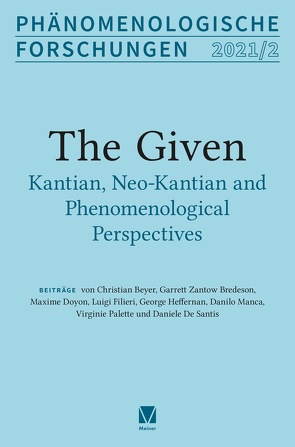
Abstracts
De Santis, Daniele, Manca, Danilo: Introduction. The Given: Historical and Hermeneutical Category or Laziness and Perversion of Reason?
Filieri, Luigi: Sellars and Kant on Givenness and Intuition.
In this paper, I argue that Sellars’s conceptualist reading of Kant, though less radical than more contemporary approaches (e. g., Brandom, McDowell), relies on a controversial account of the relations between the givenness of intuitions, the productive imagination and the power of judgment. I will discuss: 1) how Sellars reconsidered Kant’s account of intuition; and 2) the kind of conceptualism he argues for. I will raise two main claims. First, Sellars’s conceptualist reading of intuition overlooks the role of space and time as givenness conditions. Second, Sellars’s account of the productive imagination disregards the complementary significance of the power of judgment in a priori synthesis, the role of which is to grant synthetic unity. My aim is to reconstruct a consistent dialogue between Sellars and Kant by discussing Sellars’s reading of a priori synthesis and comparing his views to Kant’s original aims.
Bredeson, Garrett Zantow: Natorp’s Critique of Appeals to Givenness in Light of the Marburg Renewal of Idealism.
For Natorp, the most urgent task for turn-of-the-century philosophy consisted in recovering the meaning of idealism. Instead of simply appealing to given facts, idealists transform givennesses of all sorts into tasks for thinking under the guidance of laws which we ourselves have laid down and for which we ourselves are responsible. In this paper I will try to connect the dots between (a) the broader Marburg project of tethering philosophy to the achievements of modern science and (b) Natorp’s critique of his contemporaries’ appeals to givenness. Understanding this connection is, in my view, crucial for appreciating the sense and grounding of Natorp’s idealism.
Palette, Virginie: The Resistance of the Given and its Demythologization in Husserl’s Phenomenology.
The objective of this paper is to reconstruct Husserl’s two-pronged approach of sensory givenness. On the one hand, the phenomenological focus on intentional consciousness implies a virulent criticismof the positivistic myth of the sensory given. On the other hand, there is also a positive appeal to sensory givenness in phenomenology, without which phenomenology would not be worthy of its name and would, ultimately, be nothing other than a form of neo-Kantianism. In the context of transcendental genetic phenomenology, Husserl manages to rehabilitate sensory givenness in a reduced, viz. demythologized form. This reconstruction of Husserl’s ambivalent reference to the given can help phenomenology defend itself against some actual trends, which tend to reduce it to phenomenalismor to conceptualism.
Manca, Danilo: Spontaneity and Givenness. Natorp, Husserl, and Sellars’s Neo-Kantianism.
In this article, I propose a comparison between Natorp, Husserl, and Sellars that has a twofold aim. First, I ask to what extent Sellars’s perspective can be considered to be Neo-Kantian. Second, I demonstrate that the point of divergence among these three thinkers does not have to do with the role they ascribe to givenness in knowledge, but with the way they conceive the activity of thinking. Focusing on Husserl’s reading of Natorp’s theses concerning the subjective and objective ground of knowledge, I show that both Natorp and Husserl agree with Sellars on the limits of a positivistic and empiricist perspective that relies on what is given in perception for the justification of one’s epistemic beliefs. On the other hand, the differences between the three thinkers emerge as soon as we consider how they attempt to integrate the spontaneity of thinking into the sphere of intuition from a renewed Kantian perspective.
De Santis, Daniele: Thought, Being, and the Given in Hans Vaihinger’s Die Philosophie des Als Ob.
The goal of the present paper is to assess Hans Vaihinger’s understanding of the notion of the given in Die Philosophie des Als Ob. The claim will be advanced that the overall framework of Vaihinger’s theory of knowledge and, more specifically, his understanding of both the given and fictions should be sought for in the manner in which R. Hermann Lotze assesses the problem of knowledge, namely, the relation between thought and being in both his early and late Logik. As we will argue, the way in which Vaihinger recasts the opposition between what is given objectively (data of sensations) and what is added subjectively is to be deemed a direct radicalization of Lotze’s own stance. As the conclusion will further add, what is at stake in Vaihinger’s fictionalism is a quite specific understanding of the ideas of reason and transcendental philosophy.
Beyer, Christian: Husserls Verhältnis zu Lotze im Lichte seines Göttinger Seminars über „Lotzes Erkenntnistheorie“.
The present contribution elucidates Husserl’s relationship to Lotze in the light of Winthrop Bell’s notes on Husserl’s 1912 seminar on Lotze’s theory of knowledge. Once again, these notes make it clear that Husserl highly appreciated the chapter on Plato’s theory of ideas from Lotze’s 1874 Logic and his anti-psychologistic view of logic, as far as it goes. However, it also becomes clear that Husserl rejected both Lotze’s account of the origins of objectivity in terms of the doctrine of “achievements of thinking (Denkleistungen)” and the discussion of skepticism in the 1874 Logic against the background of his own (Bolzano-inspired) conception of intentionality and his treatment of the epistemological “problem of transcendence” in the framework of the “phenomenological reduction”.
Hefferman, George: Existential Evidence. The Role of Self-Giving in Husserl’s Phenomenology of Existence.
In this paper, I examine, in five parts, the nature and function of evidence in Husserl’s phenomenology of existence. By “evidence” I understand the intentional achievement of self-giving in Husserl’s sense, and by “phenomenology of existence” I understand the branch of his philosophy that addresses the question concerning a meaningful life. In Part One, I propose that Husserl’s philosophy includes a phenomenology of existence. In Part Two, I employ a selection of texts from Grenzprobleme der Phänomenologie to sketch the basic outlines of his phenomenology of existence. In Part Three, I demonstrate that Husserl develops a concept of evidence rich enough to encompass the evidence appropriate to his phenomenology of existence. In Part Four, I investigate the way in which Husserl appeals to what one may describe as “existential evidence” to ground his manner of apprehending the world as he sees it. In Part Five, I expand the horizon of the investigation by situating “existential evidence” – the “given” that keeps on giving – in the context of other kinds of evidence more familiar to scholars and students of Husserl’s phenomenology.
Doyon, Maxime: La Gestalt d’autrui. Note sur l’étendue de l’influence de la Gestaltpsychologie chez Merleau-Ponty.
The recognition of a meaningful sensory foundation of perception is central to Maurice Merleau-Ponty’s philosophy. If some commentators do not hesitate to see in the notion of perceptual Gestalt a notion applicable to all domains of being, it is not a priori easy to see how it must be conceived in the more specific context of the perception of others (autrui). However, Merleau-Ponty is very clear on this point: all perception manifests itself in the form of a Gestalt, including the perception of other people. The ambition of this short study is to spell out in rough strokes how this injunction should be heard and thus to explain how others manifest themselves as Gestalts to perceptual consciousness.
Aktualisiert: 2023-05-21
> findR *
MEHR ANZEIGEN
Bücher von Römer, Inga
Sie suchen ein Buch oder Publikation vonRömer, Inga ? Bei Buch findr finden Sie alle Bücher Römer, Inga.
Entdecken Sie neue Bücher oder Klassiker für Sie selbst oder zum Verschenken. Buch findr hat zahlreiche Bücher
von Römer, Inga im Sortiment. Nehmen Sie sich Zeit zum Stöbern und finden Sie das passende Buch oder die
Publiketion für Ihr Lesevergnügen oder Ihr Interessensgebiet. Stöbern Sie durch unser Angebot und finden Sie aus
unserer großen Auswahl das Buch, das Ihnen zusagt. Bei Buch findr finden Sie Romane, Ratgeber, wissenschaftliche und
populärwissenschaftliche Bücher uvm. Bestellen Sie Ihr Buch zu Ihrem Thema einfach online und lassen Sie es sich
bequem nach Hause schicken. Wir wünschen Ihnen schöne und entspannte Lesemomente mit Ihrem Buch
von Römer, Inga .
Römer, Inga - Große Auswahl an Publikationen bei Buch findr
Bei uns finden Sie Bücher aller beliebter Autoren, Neuerscheinungen, Bestseller genauso wie alte Schätze. Bücher
von Römer, Inga die Ihre Fantasie anregen und Bücher, die Sie weiterbilden und Ihnen wissenschaftliche Fakten
vermitteln. Ganz nach Ihrem Geschmack ist das passende Buch für Sie dabei. Finden Sie eine große Auswahl Bücher
verschiedenster Genres, Verlage, Schlagworte Genre bei Buchfindr:
Unser Repertoire umfasst Bücher von
- Romera, María Ángeles Martín
- Romerein, Lisa
- Romerio, Flavio
- Römermann, Hans D.
- Römermann, Hans D.
- Römermann, Lars
- Römermann, Lars
- RÖMERMANN, LESLIE
- Römermann, Lyudmyla
- Römermann, Martin
Sie haben viele Möglichkeiten bei Buch findr die passenden Bücher für Ihr Lesevergnügen zu entdecken. Nutzen Sie
unsere Suchfunktionen, um zu stöbern und für Sie interessante Bücher in den unterschiedlichen Genres und Kategorien
zu finden. Neben Büchern von Römer, Inga und Büchern aus verschiedenen Kategorien finden Sie schnell und
einfach auch eine Auflistung thematisch passender Publikationen. Probieren Sie es aus, legen Sie jetzt los! Ihrem
Lesevergnügen steht nichts im Wege. Nutzen Sie die Vorteile Ihre Bücher online zu kaufen und bekommen Sie die
bestellten Bücher schnell und bequem zugestellt. Nehmen Sie sich die Zeit, online die Bücher Ihrer Wahl anzulesen,
Buchempfehlungen und Rezensionen zu studieren, Informationen zu Autoren zu lesen. Viel Spaß beim Lesen wünscht Ihnen
das Team von Buchfindr.




